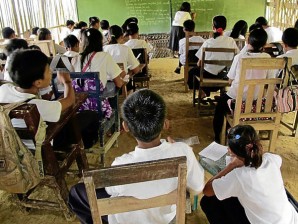MANILA, Philippines–Business and academic leaders on Tuesday threw their weight behind the shift to the K-12 basic education system and called on the government to ensure a smooth transition to the new scheme.
Through the newly formed National Industry-Academe Council (NIAC), the leaders suggested ways for the government to improve the implementation of the K-12 system which it targets to fully implement nationwide by 2016.
“The additional years of schooling are seen to have a positive impact on wages and the economy’s annual GDP growth,” said Dr. Ricardo Rotoras, president of the Philippine Association of State Universities and Colleges and the Mindanao University of Science and Technology.
NIAC officials pointed out that some benefits of the reform measure include the enhancement of the education system; the production of “college-ready” students; career-ready students by the end of their schooling; producing globally competitive graduates; an increased demand for quality faculty; lower unemployment and higher wages; and overall economic growth and social inclusion.
“The new K-12 curriculum helps our students acquire knowledge, learn skills, and form values that will be beneficial to them, whether they choose to go to college, work or even start their own businesses after high school,” added Dr. Jose Paulo Campos, president of the Philippine Association of Private Schools, Colleges and Universities (Papscu).
NIAC said it would facilitate dialogues between various agencies and other interest groups to discuss issues and explore interventions and assistance measures, and creating a unified transition fund in view of the expected losses that will be incurred during the transition.
NIAC also recommended that government expedite the process of allowing schools to offer stand-alone senior high school programs in order to encourage the participation of schools.
NIAC co-vice chairman and Ayala Corp chair Jaime Augusto Zobel de Ayala said there should be a lot of coordination between the academe and the industry because “The future needs it.”
He pointed out that the industry was always looking for young people with specific skills and the K to 12 program is “an absolute necessity” to providing the apt manpower.
“We have to align ourselves with global standards,” Ayala added, saying that the K to 12 program could be key to resolving the skills-jobs mismatch that has bloated the country’s youth unemployment rate.
Facilitated by Philippine Business for Education, with funding from the United States Agency for International Development mission in the Philippines, NIAC brings together leaders from both industry and academe to raise industry involvement in higher and technical education.
It was formed to create a short- to medium-term agenda centered on addressing the perennial mismatch between the demands of the industry and the graduates of the academe.
Specifically, NIAC will work on involving industry in higher education curriculum improvement, national and local human resource planning and development, and accessibility to market information across various sectors.
It is co-chaired by Ramon del Rosario Jr., president of Phinma Corp. and Fr. Jose Ramon Villarin SJ, president of the Ateneo de Manila University. Its co-vice chairs are Zobel de Ayala and Dr. Rotoras.–With Jeannette Andrade
